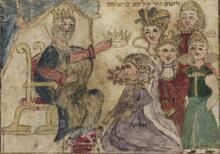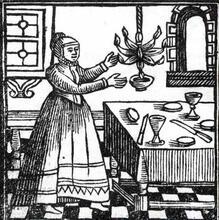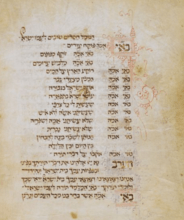Zeresh: Midrash and Aggadah
Zeresh was the wife of Haman, portrayed by the midrash as even more wicked than her husband. Of all of Haman's advisors, she was his best counsel. In one midrashic account, she was the one to advise Haman to kill the Jews as punishment for Mordecai’s refusal to bow to him. Because he heeded her advice, he himself was hanged on the gallows that he had prepared for Mordecai. The Rabbis prescribe that on Purim everyone must say: “Cursed be Haman, cursed be his sons, cursed be Zeresh his wife,” thereby fulfilling Prov. 10:7: “But the name of the wicked rots” (Esth. Rabbah 10:9).
More Wicked than Haman
The A type of non-halakhic literary activitiy of the Rabbis for interpreting non-legal material according to special principles of interpretation (hermeneutical rules).midrash portrays Zeresh as being even more wicked than her husband Haman (Midrash le-Esther, Ozar ha-Midrashim [ed. Eisenstein], p. 51). Wise women are celebrated in Proverbs (14:1): “The wisest of women builds her house,” while the end of this verse says of the wicked Zeresh: “but folly tears it down with its own hand” (Midrash Proverbs 14:1).
The Book of Esther relates that Haman, incensed after he saw that Mordecai did not prostrate himself before him, returned home to consult with his friends and his wife Zeresh. The midrash elaborates that Haman’s friends were his wife’s lovers and that Haman also had mistresses, for all idolaters are licentious (Midrash Panim Aherim [ed. Buber], version B, chapter 5).
In another midrashic account, Haman had 365 advisors, like the days of the year, but none could give him advice as good as that of his wife Zeresh. She told him: “If this man of whom you speak is of Jewish stock, you will not overcome him, but you must act wisely against him. If you were to drop him into a fiery furnace, Hananiah, Mishael, and Azariah were already dropped down there and they were saved. If you were to throw him into a lions’ den, Daniel was already thrown into a lions’ den and he emerged unscathed. If you were to put him in prison, Joseph was already incarcerated there and he left it. If you were to send him to the wilderness, Israel already were in the wilderness, they were fruitful and multiplied, they withstood all the tests, and they were saved. If you were to blind him, Samson killed many Philistines when he was blind. But hang him on the gallows, for we have not found a single one of the Jews who was saved from hanging.” Immediately (Esth. 5:14) “the proposal pleased Haman, and he had the gallows put up” (Esth. Rabbah 9:2; Midrash Abba Gurion [ed. Buber], chapter 5).
Haman’s Death from Heeding Zeresh’s Advice
The Rabbis apply to Haman, who heeded his wife’s counsel, the verse (Prov. 10:1): “a dull son is his mother’s sorrow.” Because he heeded her advice, he himself was hanged on the gallows that he had prepared for Mordecai. The Rabbis ask why Haman was not successful in using his riches to save himself from the scaffold. They reply that the case of Haman teaches us that all of a wicked man’s riches will be of no avail when his downfall is at hand (Midrash Proverbs 10:1).
Haman’s downfall began when Ahasuerus ordered him to parade Mordecai on horseback through the streets of the city. According to the midrash, when Haman did so, their route led through a lane that went past Haman’s house. Haman’s daughter looked down from the roof and thought that the rider on horseback was her father and that Mordecai was leading him. She took a full chamber pot and emptied it on his head. Haman looked up; his daughter saw that this was her father, and in her great amazement and distress she fell from the roof to her death. Therefore it is said (Esth. 6:12): “Haman hurried home, his head covered in mourning”—he was “in mourning” over his daughter’s death and “his head was covered” with filth (BT Megillah 16a). This midrashic account accentuates Haman’s great shame in the eyes of his household and those of the entire kingdom. The daughter’s act symbolized what would befall her father. Haman sought to maltreat Mordecai, but in the end he harmed himself. The daughter’s fall from the roof was therefore a portent of her father’s imminent ruin.
Afterwards, Haman returned home to once again take counsel with Zeresh and his confidants. According to the midrash, they told him: If Mordecai is from one of the tribes of Israel, you will prevail over him, but if he is from the tribe of Judah, or of Benjamin, Ephraim or Manasseh, you will not overcome him. For it is written of Judah (Gen. 49:8): “Your hand shall be on the nape of your foes”; and it is said of Benjamin, Ephraim and Manasseh (Ps. 80:3): “at the head of Ephraim, Benjamin, and Manasseh! Rouse Your might and come to our help!” These tribes received a special blessing that they would triumph over their enemies; Mordecai is a Benjaminite, and therefore you cannot harm him. They also told him: The people of Israel are compared to the dust and the stars. When they descend, they descend to the dust; and when they rise, they rise to the stars. So now that Mordecai is in the ascent, you will no longer be able to harm him (BT Megillah 16a).
The Rabbis prescribe that on Holiday held on the 14th day of the Hebrew month of Adar (on the 15th day in Jerusalem) to commemorate the deliverance of the Jewish people in the Persian empire from a plot to eradicate them.Purim everyone must say: “Cursed be Haman, cursed be his sons, cursed be Zeresh his wife,” thereby fulfilling Prov. 10:7: “But the name of the wicked rots” (Esth. Rabbah 10:9).





